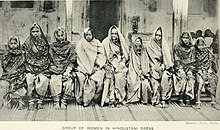
Back كورمي Arabic Kurmi German Kurmi (casta) Spanish Kurmi French कुर्मी Hindi Kurmi Italian Kurmi Portuguese Kurmi Swedish குர்மி மக்கள் Tamil

Kurmi is traditionally a non-elite tiller caste in the lower Gangetic plain of India, especially southern regions of Awadh, eastern Uttar Pradesh and parts of Bihar.[1] The Kurmis came to be known for their exceptional work ethic, superior tillage and manuring, and gender-neutral culture, bringing praise from Mughal and British administrators alike.[2][3][4]
- ^ Bayly, Susan (2001), Caste, Society and Politics in India from the Eighteenth Century to the Modern Age, Cambridge University Press, pp. 200–, ISBN 978-0-521-79842-6,
In southern Awadh, eastern NWP, and much of Bihar, non-labouring gentry groups lived in tightly-knit enclaves among much larger populations of non-elite 'peasants' and labouring people. These other groupings included ... non-elite tilling and cattle-keeping people who came to be known by such titles as Kurmi, Koeri and Goala/Ahir.
- ^ Cite error: The named reference
Bayly1988-p478was invoked but never defined (see the help page). - ^ Cite error: The named reference
Bayly1988-p101was invoked but never defined (see the help page). - ^ Cite error: The named reference
bayly-p41was invoked but never defined (see the help page).